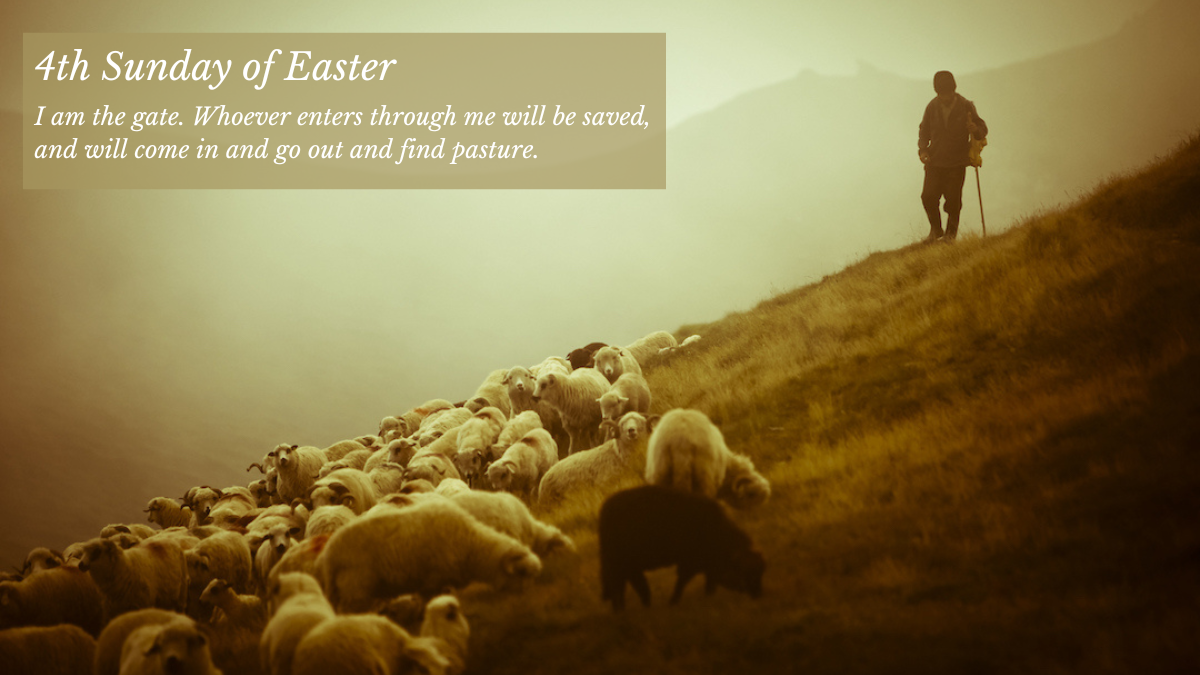On the Back Porch
Reading, pondering and studying God’s Word is sometimes best done “on the back porch.” Each week we will try to offer something for you and your “back porch time.”

4th Sunday of Easter

The Gate
The gospel text for this Sunday is taken from the Gospel of John (10:1-10). The text has sheep, shepherds but rather than describing a bucolic scene, the passage seems to begin with a harsh, accusatory tone. It is almost as if we have picked up an on-going conversation. And we have. There are many commentators who set the boundaries of this gospel pericope as John 9:39-10:21 in order that the reader understand the scene that is unfolding.
Chapter 9 is essentially the narrative of the “man born blind” whom Jesus heals on the Sabbath – much to the exasperation of the religious authorities who cannot see the glory of God revealed in this sign. Instead the authorities are more concerned with a violation of Sabbath rules and want to get to the bottom of the “who, what, when and where” of the miracle. They never seem to pursue “why” it was done and on the Sabbath. One of their agenda was to discredit the notion that Jesus was the promised Messiah (cf. 9:22). At the end of the narrative, the now-sighted man has been thrown out of the Temple and Jesus comes to him. While the man comes to believe in Jesus as Messiah, the religious authorities are, at best, divided – and in fact are plotting to do away with Jesus. Jesus knows their hearts and that gives context to the verse that follows: Amen, amen, I say to you, whoever does not enter a sheepfold through the gate but climbs over elsewhere is a thief and a robber.
Jesus is rebuking the religious authorities because they had become irresponsible and thieving shepherds, feeding themselves rather than their flock. The condemnation of the shepherds would have been a theme well understood from the OT narrative. Crucial to the identification of the author’s purpose at this point is the necessary realization that he is writing about Jesus with the text of Ezekiel 34 in clear view. (Note: it would be good to pause at this point and read Ezekiel 34) In that passage, Ezekiel, speaking God’s word, rebukes and condemns the kings and authorities of his own time. They too had fed themselves rather than their flock. Thus God would take away their position and authority and become the shepherd himself. Finally he would appoint another shepherd after the figure of David. John sees all of this coming true and fulfilled in Jesus: the Good Shepherd. Thus John makes clear that the glory of God is being revealed in the pastoral metaphor of shepherd in that Jesus’ fidelity to his sheep, his sacrifice for them, will stand in contrast to the failure of the blinded, bullying authorities of John 9.
The metaphors come fast and often in John 10. There are the sheep — easily identified as the flock that Jesus intends to lead into good pasture (v. 9), those whom he knows by name and who recognize his voice (vv. 3–4, 14), those whom he intends to defend against thieves and robbers (vv. 1, 8, 10) and whom he wishes to join together with all others who, listening to his voice, will come into the one fold (v. 16). Jesus will effect all this because he is the Good Shepherd (vv. 11, 14), loved by the Father because he will lay down his life for the sheep. It is this act of total, loving self-sacrifice that is mentioned again and again as the central motif. Appearing first in v.11 as the good shepherd title is introduced, it occurs again in verses 15, 17, and twice in verse 18. Though the shepherd-sheep metaphor was well known in the OT, this laying down of the shepherd’s life is something new. It is the characteristic function of Jesus. He is the Good Shepherd, especially because of his willing self-sacrifice.
The Traits of the Shepherd
The list of God’s character traits found in Exodus 34:6-7 is the most repeated and re-quoted text in the Bible. In this video, we’ll explore this foundational description of God’s attributes that illustrates what God values and why he acts the way he does. What is it about the Good Shepherd that instills in the sheep the desire to follow?